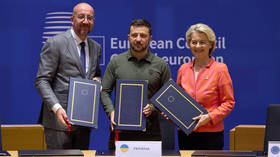Luxembourg signs security deal with Ukraine
Kiev has already sealed similar deals with several NATO members, including the US and Britain
Kiev signed a security deal with Luxembourg on Wednesday, with Ukrainian leader Vladimir Zelensky describing the agreement as “political and value-based cooperation.”
Luxembourg is a small duchy with a population of 672,000 people, which shares borders with France, Germany, and Belgium. It is one of the founding members of NATO. Zelensky and Prime Minister Luc Frieden signed the pact in Washington, DC, where they attended a NATO summit.
Ukraine has signed some two dozen similar bilateral treaties with NATO members, including the UK, France, and Germany since January 2024, while the alliance ruled out Kiev’s membership until its conflict with Russia is resolved. In June, Ukraine signed security agreements with the US and the EU.
None of these documents have the power of Article 5 of the NATO Charter, which stipulates that an attack against one member must be treated as an attack against the alliance as a whole. The treaties do not mandate that Kiev’s supporters must be directly involved in the fighting with Moscow.
The text published by Kiev says that Luxembourg will take “the co-lead role” with Estonia and Ukraine to strengthen Ukraine’s IT capabilities and participate in programs aimed at boosting Ukraine’s Air Force and artillery.
Luxembourg will support Kiev “through the provision of intelligence, surveillance and reconnaissance (ISR) capabilities, including in the space domain, and cyber-electromagnetic capabilities.” It will also help to train the Ukrainian army.
The duchy has already provided military aid to Ukraine worth over €250 million ($270.74 million), according to Kiev. It also allocated €80 million ($86.64 million) for further defense assistance this year.
Zelensky said that the agreement “focuses on political and value-based cooperation between our countries,” and thanked the duchy for backing Kiev’s aspirations to join the EU and NATO.
Frieden wrote on X (formerly Twitter) that the goal is to “guarantee security, the rule of law and freedom in Europe.”
Moscow has repeatedly stated that continued Western arms deliveries to Ukraine will prolong the conflict but will ultimately fail to stop Russian troops. The West’s deeper involvement in the standoff also risks a direct confrontation between NATO and Russia, the Kremlin has stated.
Presidential spokesman Dmitry Peskov also said earlier that nations providing security guarantees to Kiev eventually make Europe less secure.






Comments are closed.